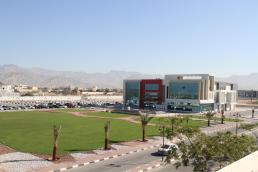The American University of Ras Al Khaimah (AURAK) and Du have signed a Memorandum of Understanding (MoU) to further collaborate on 5G and the Internet of Things (IoT) development as part of the UAE 5G Innovation Gate (U5GIG).
As per the agreement, Du will collaborate with AURAK for the research and development of the 5G systems including massive MIMO and cloud computing. The U5GIG has been envisioned to be a consortium of industrial and academic organizations within the UAE, supported by international telecommunications organizations, in order to develop a global 5G network that will radically change lives across the UAE by building a super-connected nation.
Speaking about the importance of U5GIG and the MoU, Ibrahim Nassir, Chief Human Capital and Administration Officer at Du, stated, “We are proud to participate in His Highness’ vision to make Dubai a hub for technology development, and this can only happen through collaboration between industry and academia. We are inspired not only to implement, but also to develop state-of-the-art technologies in UAE and make it available to UAE students at AURAK through our MOU. Together with the AURAK, we will establish an open platform for research and development to participate in the standardization and development of 5G and IoT use in the UAE.”
Commenting on the new relationship, AURAK president, Prof. Hassan Hamdan Al Alkim stated, “We are delighted to be signing this strategic partnership with Du. Bearing in mind that we offer a bachelor’s degree in electronics and communications engineering, this agreement makes a great deal of sense, and will ultimately benefit our students in the form of practical experience and future opportunities. As a university, we are also heavily involved in research, with the aim of producing knowledge that can better society and improve the quality of life. We are excited by the possibilities and mutual benefits that this collaboration can produce.”
In 2016 AURAK established its ICT Center for Teaching and Creativity in Informatics, Communication and Networking (ICONET), led by Dr. Abdul-Halim Jallad, while also signing a further agreement with the federal Telecommunications and Regulatory Authority’s ICT Fund.
The university’s School of Engineering currently offers ten undergraduate programs and a master’s degree in engineering project management. Last year saw two of the school’s programs – computer engineering and electronics and communications engineering – gain ABET accreditation. Further programs are expected to gain accreditation in 2017.




